Beta Alanin
-
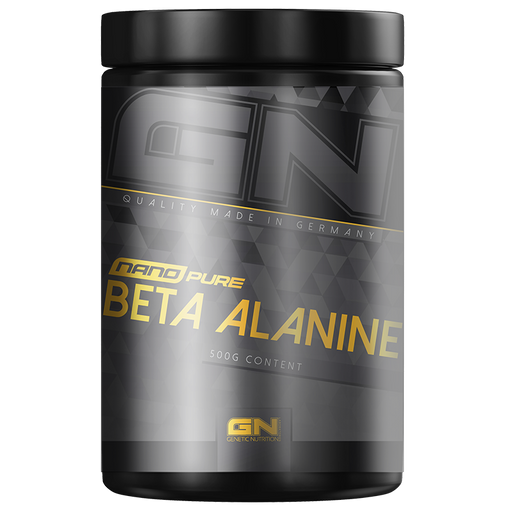 Jetzt 0% sparen
Jetzt % sparen
Original-Preis €22,90 - Original-Preis €22,90Original-Preis €22,90€22,90€22,90 - €22,90Aktueller Preis €22,90|/
Jetzt 0% sparen
Jetzt % sparen
Original-Preis €22,90 - Original-Preis €22,90Original-Preis €22,90€22,90€22,90 - €22,90Aktueller Preis €22,90|/Nano Pure Beta Alanine · 500g
GN Laboratories13 reviewsBeta Alanin ist eine Aminosäure, die vor allem in Pre-Workout Supplements oft zum Einsatz kommt. Schaut man sich jedoch die Befunde zahlreicher Stu...
Vollständige Details anzeigenOriginal-Preis €22,90 - Original-Preis €22,90Original-Preis €22,90€22,90€22,90 - €22,90Aktueller Preis €22,90|/Jetzt 0% sparen Jetzt % sparen -
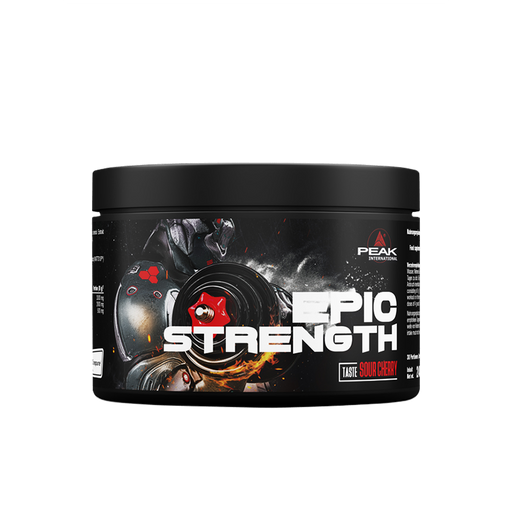 Jetzt 0% sparen
Jetzt % sparen
Original-Preis €19,90 - Original-Preis €19,90Original-Preis €19,90€19,90€19,90 - €19,90Aktueller Preis €19,90|/
Jetzt 0% sparen
Jetzt % sparen
Original-Preis €19,90 - Original-Preis €19,90Original-Preis €19,90€19,90€19,90 - €19,90Aktueller Preis €19,90|/Epic Strengh · 240g
PEAK1 reviewDas Fundament für mehr Kraft und Power Mit Creatin (Creapure®) und Beta-Alanin Fördert die Kraftsteigerung Verbessert die Kraftausdauer Mit Citrus...
Vollständige Details anzeigenOriginal-Preis €19,90 - Original-Preis €19,90Original-Preis €19,90€19,90€19,90 - €19,90Aktueller Preis €19,90|/Jetzt 0% sparen Jetzt % sparen -
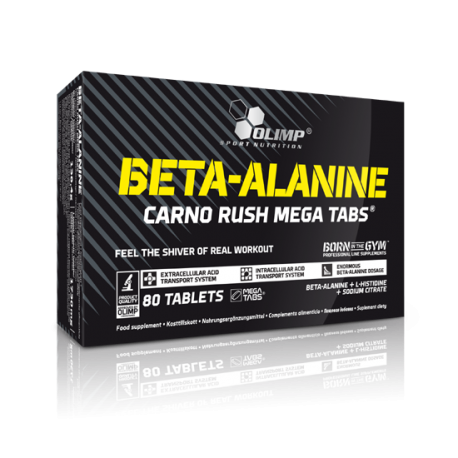 Jetzt 11% sparen
Jetzt % sparen
Original-Preis €9,90Original-Preis €9,90 - Original-Preis €9,90Original-Preis €9,90Aktueller Preis €8,81€8,81 - €8,81Aktueller Preis €8,81|/
Jetzt 11% sparen
Jetzt % sparen
Original-Preis €9,90Original-Preis €9,90 - Original-Preis €9,90Original-Preis €9,90Aktueller Preis €8,81€8,81 - €8,81Aktueller Preis €8,81|/Beta-Alanine Carno Rush Mega Tabs · 80 Tabletten
Olimp Sport Nutrition1 reviewBeta-Alanin erhöht den Carnosinspiegel im Muskel und kann dadurch die Muskelleistung verbessern Keine Veränderung des Hormonspiegels erforderlich,...
Vollständige Details anzeigenOriginal-Preis €9,90Original-Preis €9,90 - Original-Preis €9,90Original-Preis €9,90Aktueller Preis €8,81€8,81 - €8,81Aktueller Preis €8,81|/Jetzt 11% sparen Jetzt % sparen -
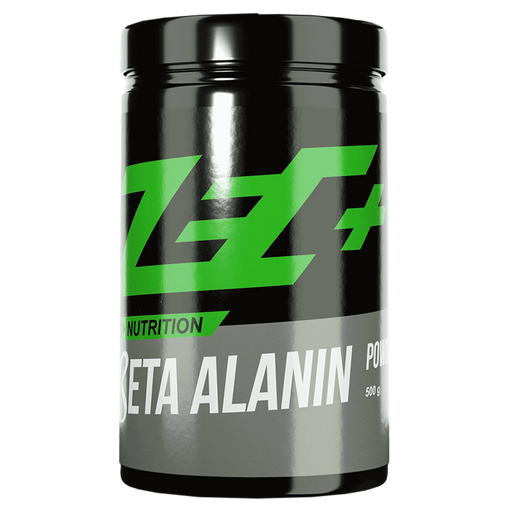 Jetzt 0% sparen
Jetzt % sparen
Original-Preis €24,90 - Original-Preis €24,90Original-Preis €24,90€24,90€24,90 - €24,90Aktueller Preis €24,90|/
Jetzt 0% sparen
Jetzt % sparen
Original-Preis €24,90 - Original-Preis €24,90Original-Preis €24,90€24,90€24,90 - €24,90Aktueller Preis €24,90|/Beta Alanin Powder · 500g
Zec+1 reviewEffektiver Muskelaufbau und -erhalt durch regelmäßige Einnahme von ZEC+ Beta Alanin. Steigert Carnosin-Spiegel im Muskel, reduziert Ermüdung und...
Vollständige Details anzeigenOriginal-Preis €24,90 - Original-Preis €24,90Original-Preis €24,90€24,90€24,90 - €24,90Aktueller Preis €24,90|/Jetzt 0% sparen Jetzt % sparen -
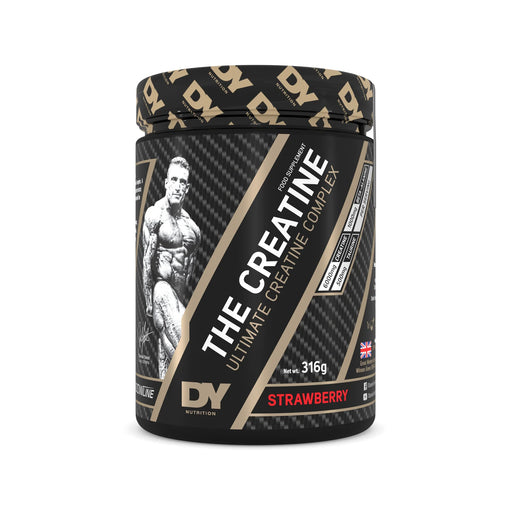 Jetzt 0% sparen
Jetzt % sparen
Original-Preis €24,90 - Original-Preis €24,90Original-Preis €24,90€24,90€24,90 - €24,90Aktueller Preis €24,90|/
Jetzt 0% sparen
Jetzt % sparen
Original-Preis €24,90 - Original-Preis €24,90Original-Preis €24,90€24,90€24,90 - €24,90Aktueller Preis €24,90|/The Creatine · 316g
DY Nutrition1 reviewMaximierte Trainingsleistung: "The Creatine" steigert mit 6 Gramm Kreatin-Monohydrat massiv die Kraft und Leistung im Fitnessstudio. Verbessert...
Vollständige Details anzeigenOriginal-Preis €24,90 - Original-Preis €24,90Original-Preis €24,90€24,90€24,90 - €24,90Aktueller Preis €24,90|/Jetzt 0% sparen Jetzt % sparen
Was ist Beta-Alanin?
B-Alanin (C3H7NO2) ist eine nichtessentielle Aminosäure und stellt die einzige natürlich vorkommende Beta Aminosäure dar.
Während man á-Alanin in vielen Nahrungsmitteln wie Eiern, Fleisch, Geflügel, Pflanzen und einigen Milchprodukten findet, wird β-Alanin im Körper durch das Enzym Beta-Ureidopropionase über die B-Alanin Synthase hergestellt. B-Alanin ist ein Abbauprodukt des Karnosins und ein Bestandteil der Pantothensäure (Vitamin B5).
Beta-Alanin ist die einzige natürlich vorkommende Beta-Aminosäure, die im Körper in begrenztem Umfang enzymatisch aus der Aminosäure Alanin hergestellt werden kann. Beta-Alanin besitzt die einzigartige Fähigkeit, den Eintritt der Muskelerschöpfung deutlich hinaus zu zögern, was zur Folge hat, dass Sie bei jedem Trainingssatz mehr Wiederholungen und während einer Trainingseinheit mehr intensive Trainingssätze ausführen können, was in einer gesteigerten Trainingswirkung und einem gesteigerten Muskelaufbau resultiert. Diese Wirkung ist nicht auf ein Training mit Gewichten beschränkt, was bedeutet, dass auch Ausdauersportler von einer Supplementierung mit Beta-Alanin profitieren können. Da es eine Vielzahl von Humanstudien gibt, die die Wirkung von Beta-Alanin zweifelsfrei belegen, wird dieses Supplement von vielen Experten als die größte Innovation im Bereich der Sportsupplementation seit der Einführung von Kreatin angesehen.
Wie wirkt Beta-Alanin?
Während intensiver Muskelanstrengungen kommt es innerhalb der Muskulatur zu einer verstärkten Produktion von Wasserstoffionen, die ein Absinken des pH Werts und eine Übersäuerung der Muskulatur zur Folge hat. Je stärker der pH Wert innerhalb der trainierten Muskeln abfällt, desto stärker sinkt auch die Leistungsfähigkeit der Muskeln, bis es schließlich zum Eintritt des Muskelversagens kommt. Der stärkste körpereigene intramuskuläre Säurepuffer Carnosin kann dieser Übersäuerung der Muskulatur während des Trainings effektiv entgegenwirken und so die Leistungsfähigkeit der trainierten Muskeln länger aufrecht erhalten, was zur Folge hat, dass Sie mehr Wiederholungen mit einem gegebenen Gewicht ausführen können und einen stärkeren Stimulus für ein Muskelwachstum setzen können. Carnosin wird im menschlichen Körper aus Beta-Alanin und Histidin hergestellt, wobei die Menge an verfügbarem Beta-Alanin der die Rate der Carnosin Produktion limitierende Faktor ist. Anders ausgedrückt bedeutet dies, dass der Körper umso mehr Carnosin produziert, je mehr Beta-Alanin im Körper vorhanden ist. Da die körpereigene Beta-Alanin Produktion genau wie die über die normale Ernährung zugeführte Beta-Alanin Menge stark begrenzt ist, kann eine signifikante Erhöhung der Carnosin Produktion nur mit Hilfe einer Beta-Alanin Supplementation erreicht werden. Studien konnten in diesem Zusammenhang zeigen, dass eine Supplementation mit etwa 3 Gramm Beta-Alanin pro Tag die Carnosinspiegel innerhalb der Muskulatur innerhalb von 4 Wochen um 65% erhöhen kann und dass bei einer längeren Supplementation eine Erhöhung der Carnosinspiegel um bis zu 80% erreicht werden kann. Als zusätzlichen Bonus ist Carnosin ein Vorläuferstoff einer Gruppe von Enzymen, die für die Produktion von Stickstoffoxyd im Körper verantwortlich sind, was zur Folge hat, dass erhöhte Carnosinspiegel in einer gesteigerten Stickstoffoxydproduktion und hiermit auch in einem stärkeren Muskelpump während des Trainings, sowie einer besseren Versorgung der trainierten Muskeln mit Sauerstoff und Nährstoffen aufgrund einer besseren Durchblutung resultieren.
Wer kann von einer Beta-Alanin Supplementation profitieren?
Prinzipiell kann jeder Sportler, der seine Ausdauer- und die Leistungsfähigkeit seiner Muskulatur steigern und einer Übersäuerung der Muskulatur während des Trainings entgegenwirken möchte, von Beta-Alanin profitieren. Besonders interessant ist eine Beta-Alanin Supplementation für ältere Sportler, da die Carnosinspiegel innerhalb der Muskulatur mit zunehmendem Alter immer weiter sinken. Da Beta-Alanin in der natürlichen Nahrung primär in Fleisch vorkommt, können auch Vegetarier, Veganer und Menschen, die wenig Fleisch essen, besonders stark von einer Beta-Alanin Supplementation profitieren.
Was sind die Hauptvorzüge von Beta-Alanin?
• Steigert die aerobe und anaerobe Muskelausdauer • Zögert die Muskelerschöpfung hinaus • Ermöglicht ein härteres Training mit mehr Wiederholungen für ein gesteigertes Muskelwachstum • Wirkt einer Übersäuerung der Muskulatur während des Trainings entgegen • Steigert die explosive Muskelkraft und die Muskelausdauer • Kann die Konzentration des Säurepuffers Carnosin in der Muskulatur um bis zu 80% erhöhen • Verstärkt den Muskelpump während des Trainings und verbessert den Transport von Nährstoffen und Sauerstoff zu den trainierten Muskeln
Mechanismen
Beta-Alanin ist eine Aminosäure, die in der Leber oder von Darmbakterien produziert wird (11, 12). Sie verbindet sich in den Muskeln und im Gehirn mit Histidin, um Carnosin zu bilden. Beta-Alanin erhöht die Carnosinspiegel in Muskeln und Gehirn und hilft den Muskeln, einer Akkumulation von Säure zu widerstehen (11, 13, 14).
Beta-Alanin agiert außerdem als hemmender Neurotransmitter und Neuromodulator. So hemmt Beta-Alanin z.B. die Aufnahme der Aminosäure Taurin in die Zellen, was oxidativen Stress, Zellschäden und Atemprobleme zur Folge haben kann (15, 16).
Darüber hinaus ist Beta-Alanin ein kompetitiver GABA Antagonist (Blocker), der auch die Nervenzellaktivität hemmt (17).
Während des Trainings verändert sich das intramusklare PH Gleichgewicht des trainierten Muskels. Während der anaeroben Energiegewinnung für muskulare Bewegungen sammeln sich Wasserstoffionen an, welche den intramuskularen PH Wert senken und zu einer Übersäuerung des Muskels führen – ein Zustand, der Entzündungen verursacht und das Muskelversagen auslöst. Carnosin spielt beim Muskelversagen eine wichtige Rolle, da es als Säurepuffer wirkt, welcher einer Übersäuerung es Muskels entgegenwirkt uns so das Muskelversagen hinauszögert.
Als Supplement zugeführt wird β-Alanin von der Skelettmuskulatur aufgenommen und zusammen mit Histidin mit Hilfe des Enzyms Karnosin Synthase zu Karnosin synthetisiert. Untersuchungen haben gezeigt, dass eine β-Alanin Supplementation die intramuskularen Karnosinspiegel um bis zu 64 % erhöhen kann! (1, 2) Erhöhte intramuskulare Karnosinspiegel können die Säurepufferungskapazität eines Muskels um bis zu 20 % steigern. Durch eine Erhöhung des Laktatschwellenwertes kann eine β-Alanin Supplementation die Muskelermüdung dramatisch hinauszögern (3) und die Arbeitskapazität und Leistungsfähigkeit der Muskulatur deutlich verbessern.
Mögliche Vorzüge von Beta-Alanin für Gesundheit und Leistungsfähigkeit
Beta-Alanin kann die sportliche Leistungsfähigkeit steigern
Zwei Metaanalysen von Studien mit insgesamt 18.000 Probanden kamen zu dem Ergebnis, dass Beta-Alanin die Kraft und die Trainingskapazität, aber nicht die Leistungsfähigkeit steigert. Beta-Alanin war bei Aktivitäten von 30 bis 10 Minuten Dauer am effektivsten (18, 19). Die Wirkung variierte basierend auf der Kondition der Probanden und dem Typ des Trainings. So konnte Beta-Alanin z.B. die Leistungen bei hochintensivem Training von kurzer Dauer (anaerobes Training, das von einer bis vier Minuten andauerte) steigern (11).
Darüber hinaus konnte Beta-Alanin bei Sportlern Trainingsvolumen und Leistungsfähigkeit bei einem Widerstandstraining steigern, was auch die Leistungen bei der Primärsportart der Sportler steigern könnte (20).
Im Rahmen einer sechswöchigen Studie mit 15 männlichen Wasserpolospielern konnte Beta-Alanin bei einer täglichen Einnahme von 6, 4 Gramm z.B. die Wurfgeschwindigkeit und die Leistungen beim 200 Meter Schwimmen verbessern (21).
Bei einer anderen Studie mit 25 Fußballspiererinnen verbesserte Beta-Alanin die Leistungen bei wiederholten Sprints und Sprüngen und steigerte die Ausdauer. Bei einer Studie mit 20 Soldaten konnten ähnliche Resultate beobachtet werden (22, 23).
Andere Studien kommen jedoch zu dem Ergebnis, dass Beta-Alanin die Leistungen bei wiederholten Sprints bei Sportlern, die täglich 6 Gramm Beta-Alanin einnahmen, nicht verbesserte (24, 25, 26). Alles in allem legen Trends nahe, dass Nichtsportler von Beta-Alanin im Rahmen von Laboruntersuchungen, aber nicht im Rahmen von Feldtests profitieren könnten. Bei Sportlern konnten hingegen Verbesserungen im Bereich der sportlichen Leistungsfähigkeit und bei hochintensivem Training beobachtet werden. Bei Mannschaftssportarten scheint Beta-Alanin Leistungen und Volumen bei einem Widerstandstraining steigern zu können (20).
Untersuchungen mit Soldaten
Ein Studienreview konnte zeigen, dass Beta-Alanin die Leistungsfähigkeit von Soldaten steigern konnte, was insbesondere bei wiederholten, hochintensiven Aktivitäten während des Kampftrainings beobachtet werden konnte (27).
Im Rahmen einer vierwöchigen Studie mit 20 Elitesoldaten, verbesserte Beta-Alanin die Sprungkraft, die Geschwindigkeit beim Schießen und die Treffergenauigkeit (23).
Eine weitere Studie mit 18 Elitesoldaten zeigte gemischte Resultate. Beta-Alanin verbesserte die Geschwindigkeit bei einer 50 Meter Trageübung und verbesserte die kognitive Leistungsfähig unter Stress. Es verbesserte jedoch die Leistungen beim Rennen, beim Sprinten und der Treffergenauigkeit nicht (28).
Beta-Alanin kann den Eintritt der Erschöpfung hinauszögern und die Milchsäurebildung in den Muskeln reduzieren
Mehrere Humanstudien kamen zur Schlussfolgerung, dass Beta-Alanin den Eintritt der Erschöpfung hinauszögert. Es ist jedoch wichtig anzumerken, dass es nur wenige Studien gibt, die seine Sicherheit untersucht haben (28, 29, 30).
Eine Metaanalyse von Studien mit insgesamt 360 Probanden zeigte, dass Beta-Alanin die Leistungen bei hochintensiven Anstrengungen verbesserte, die länger als eine Minute andauern (18). Ein Studienreview zum Thema fand heraus, dass Beta-Alanin die Milchsäurebildung während hochintensiven, anaeroben Anstrengungen reduzierte, was die Erschöpfung hinauszögerte (31). Im Rahmen einer vierwöchigen Studie reduzierte Beta-Alanin die Säurebildung im Muskel während hochintensivem Radtraining (32). Beta-Alanin reduzierte außerdem im Rahmen von 2 Studien mit 15 trainierten Sprintern und 51 nichtsportlichen Teilnehmern die Erschöpfung (30, 33).
Die individuellen Verbesserungen variieren jedoch stark von Person zu Person. Im Rahmen einer fünfwöchigen Sprintstudie mit 11 Männern konnte Beta-Alanin weder die Leistungsfähigkeit steigern, noch die Erschöpfung reduzieren (34).
Zusammenfassend kann man sagen, dass die Hinweise, die unterstützen, dass Beta-Alanin eine Rolle bei der Reduzierung von Milchsäurebildung und Erschöpfung besitzt, vielversprechend sind, auch wenn es einige widersprüchliche Studien gibt.
Beta-Alanin könnte den Muskelaufbau fördern
Im Rahmen einer dreiwöchigen Studie mit 46 Männern, die ein hochintensives Intervalltraining absolvierten, erhöhte Beta-Alanin die Sauerstoffaufnahme, die Atemschwelle (der Punkt des Trainings, an dem die Sauerstoffverwendung die Sauerstoffzufuhr überschreitet), die Ausdauer und das Durchhaltevermögen, sowie die fettfreie Muskelmasse (35).
Im Rahmen einer ähnlichen achtwöchigen Studie mit 44 Frauen reduzierte Beta-Alanin den Körperfettanteil und erhöhte sowohl fettfreie Körpermasse, als auch Gesamtkörpermasse (36).
Beta-Alanin könnte Anti-Aging Eigenschaften besitzen
Vorläufige Untersuchungen legen nahe, dass Beta-Alanin für ältere Menschen von Vorteil sein könnte. Im Rahmen einer dreimonatigen Studie mit 18 älteren Menschen konnten beobachtet werden, dass Beta-Alanin die Trainingskapazität bei den Probanden erhöhte (9).
Beta-Alanin verbesserte außerdem die Beinmuskelfunktion bei alten Mäusen (37). Beta-Alanin bildet in den Muskeln das Molekül Carnosin. Carnosin reduzierte bei alten Ratten mit dem Altern in Verbindung stehenden Stress. Dieser Typ von Stress schädigt die Zellen und erhöht das Risiko für alterbedingte chronische Erkrankungen (38, 13, 39, 40).
Bei alten Mäusen erhöhte eine Kombination von Beta-Alanin und Epigallocatechin Gallat die Lebensspanne (41).
Auch hier bedarf es weiterer Studien, bevor aussagekräftige Schlussfolgerungen gezogen werden können.
Beta-Alanin könnte die kognitive Funktion unter Stress verbessern
Im Rahmen einer Studie mit 18 Elitesoldaten verbesserte Beta-Alanin die kognitive Leistungsfähigkeit während des Kampftrainings (28).
Im Rahmen anderer Studien mit 20 Elitesoldaten uns 19 Sportlern konnte hingegen weder unter Stress noch im Normalzustand eine Verbesserung der Gehirnfunktion beobachtet werden (23, 42) Aufgrund dieser widersprüchlichen Resultate bedarf es weiterer Studien, um mehr Licht auf die Auswirkungen von Beta-Alanin auf die kognitive Funktion unter Stress zu werfen.
Beta-Alanin könnte bei Angst und posttraumatischen Belastungsstörungen helfen
Beta-Alanin erhöht im Gehirn die Carnosin- und Serotoninspiegel. Carnosin konnte bei Nagetieren Angst reduzieren. Es erhöhte die Spiegel des angstlindernden Moleküls Brain-derived Neurotrophic Factor (BDNF), welcher bei Ratten mit posttraumatischen Belastungsstörungen niedriger ausfällt. Beta-Alanin könnte Angst durch eine Aufrechterhaltung normaler Konzentrationen dieses Moleküls im Gehirn lindern (43, 44, 45).
Beta-Alanin könnte außerdem für posttraumatische Belastungsstörungen typische Verhaltensweisen reduzieren. Bei Ratten verbesserte Beta-Alanin Verhaltensmuster posttraumatischer Belastungsstörungen und hielt normale Spiegel des BDNF aufrecht (43).
Eine ähnliche mit Nagetieren durchgeführte Studie zeigte hingegen keine verhaltenstechnischen Verbesserungen (14).
Beta-Alanin könnte bei Gehirnverletzungen positive Auswirkungen besitzen
Bei Ratten reduzierte Beta-Alanin Verhaltensveränderungen nach milden, traumatischen Verletzungen des Gehirns (14).
Beta-Alanin könnte die Körperkomposition verbessern
Einige Hinweise deuten darauf hin, dass Beta-Alanin sich positiv auf die Körperkomposition auswirken könnte.
Eine Studie zeigte, dass eine Supplementation mit Beta-Alanin für drei Wochen die Muskelmasse erhöhte (28). Es ist möglich, dass Beta-Alanin die Körperkomposition durch eine Erhöhung des Trainingsvolumens und eine Förderung des Muskelwachstums verbessern könnte. Andere Studien konnten jedoch keine signifikanten Unterschiede bezüglich Körperkomposition und Körpergewicht nach einer Supplementation mit Beta-Alanin beobachten (46, 47).
Weitere Gesundheitsvorzüge von Beta-Alanin
Beta-Alanin erhöht die Carnosinspiegel, was zahlreiche Gesundheitsvorzüge mit sich bringen kann. Interessanterweise deuten mit Tieren und im Reagenzglas durchgeführte Studien darauf hin, dass Carnosin antioxidative und die Immunfunktion verbessernde Eigenschaften besitzen, was jedoch noch durch Humanstudien bestätigt werden muss.
Die antioxidativen Vorzüge von Carnosin umfassen die Neutralisierung freier Radikale und eine Reduzierung von oxidativem Stress (48, 49, 50).
Darüber hinaus legen im Reagenzglas durchgeführte Untersuchungen nahe, dass Carnosin die Stickstoffoxydproduktion erhöht. Dies könnte dabei helfen, den Alterungsprozess zu verlangsamen und die Herzgesundheit zu verbessern (51).
Zu guter Letzt könnte Carnosin Qualität und Funktion der Muskeln bei älteren Menschen verbessern (52, 53).
Mögliche Kombinationen von Beta-Alanin mit anderen Supplements
Beta-Alanin wird häufig mit anderen Supplements inklusive Natrium Bicarbonat und Kreatin kombiniert.
Natrium Bicarbonat
Natrium Bicarbonat steigert die Trainingsleistung durch eine Reduzierung des Säuregrades von Blut und Muskeln (54).
Viele Studien haben die Kombination von Beta-Alanin und Natrium Bicarbonat. Die Resultate legen einige Vorzüge dieser Kombination von Supplements nahe – insbesondere während des Trainings, während dem eine Übersäuerung der Muskeln die Leistungsfähigkeit reduziert (55, 56).
Kreatin
Aktuelle wissenschaftliche Studien zeigen, dass Beta-Alanin zusätzliche Vorzüge mit sich bringt, wenn es mit Kreatin Monohydrat kombiniert wird (4). Eine Studie konnte zeigen, dass eine kombinierte Beta-Alanin und Kreatin Monohydrat Supplementation eine synergistische Wirkung besitzt, durch welche die Kraftfreisetzung dramatisch gesteigert werden konnte (5). Außerdem waren die Zuwächse an fettfreier Körpermasse und Kraft, sowie die Reduzierung des Körperfettes deutlich größer als bei einer alleinigen Kreatin Monohydrat Supplementation (6).
Es wird angenommen, dass Beta-Alanin die Wirkungen einer Kreatin Monohydrat Supplementation durch seine Fähigkeit zu Erhöhung der Karnosinkonzentration und eine verbesserte Funktion des anaeroben Energiesystems verstärkt, während Kreatin dabei hilft, die hochintensive Trainingsleistung durch eine Erhöhung der ATP Verfügbarkeit zu steigern.
Es konnte in der Tat gezeigt werden, dass eine Kombination von Kreatin und Beta-Alanin die Trainingsleistung, die Kraft und die fettfreie Muskelmasse erhöhen kann (57, 58, 59).
Taurin
Hohe Konzentrationen von Beta-Alanin reduzierten bei Ratten die Taurinspiegel (17). Die für Menschen empfohlene Dosierung von Beta-Alanin ist jedoch wahrscheinlich zu gering, um die Taurinspiegel im Körper signifikant zu senken (66). So zeigte eine zehnwöchige Studie mit 13 Männern, dass eine Beta-Alanin Supplementation die Taurinspiegel nicht reduzierte (67).
Eine Taurin Supplementation verhindert eine mögliche Reduzierung der Taurinspiegel durch Beta-Alanin. Die Kombination von Beta-Alanin und Taurin half Mäusen dabei, Muskelerschöpfung zu bekämpfen (68).
Wer benötigt es?
Frauen und Vegetarier haben niedrigere Muskelcarnosinspiegel als Männer und Fleischesser. Darüber hinaus sinken die Muskelcarnosinspiegel mit zunehmendem Alter (8, 9). Zusätzlich hierzu beeinflusst auch die Körperkomposition und die Muskelfaserkomposition den Einfluss von Beta-Alanin auf die körperliche Leistungsfähigkeit.
Personengruppen, die am meisten von einer Beta-Alanin Supplementation profitieren können, umfassen (10):
- Frauen
- Ältere Menschen
- Vegetarier
- Menschen mit großen Mengen an Typ I Muskelfasern / niedrigen Mengen an Typ II Muskelfasern
Wie viel sollte man einnehmen und gibt es irgendwelche Nebenwirkungen?
Die Einnahmeempfehlung auf dem Etikett sollte genau befolgt werden. Studien haben gezeigt, dass die maximale Wirkung nach einer zehnwöchigen Einnahme beobachtet werden kann (7). Dosierung und Timing können die Resultate einer Beta-Alanin Supplementation beeinflussen. Beta-Alanin induzierte Verbesserungen der Trainingsleistung konnten bei einer Verwendung höherer Dosierungen (3,2 bis 6,4 Gramm pro Tag) für mindestens einen Monat beobachtet werden (12).
Die International Society of Sports Nutrition (ISSN) empfiehlt 4 bis 6 Gramm Beta-Alanin pro Tag für mindestens 4 Wochen. Diese Dosis kann man auf einmal oder auf mehrere Einzelgaben aufgeteilt einnehmen, um das typische kribbeln zu reduzieren (60)
Eine Dosierung von bis zu 12 Gramm pro Tag (mit verzögerter Freisetzung) wird als sicher und effektiv angesehen (61).
Eine Einnahme von Beta-Alanin mit einer Mahlzeit kann die Carnosinspiegel weiter erhöhen (62). Interessanterweise scheint die Einnahme eines Beta-Alanin Supplements besser als die Einnahme von Carnosin zu sein, wenn es um eine Erhöhung der Carnosinspiegel geht (63).
Sicherheit und Nebenwirkungen
Bei hoher Dosierung kann es zu einer leichten Hautrötung und einem kribbelnden Gefühl kommen, das als Paraesthesie bezeichnet wird und für gewöhnlich im Bereich von Gesicht, Hals und Handrücken spürbar ist. Dieser Effekt ist harmlos und verschwindet, im Laufe der Zeit. wenn die Einnahmedosis reduziert wird.
Die Intensität dieses Kribbelns steigt mit der verwendeten Dosierung. Diese Nebenwirkung kann vermieden werden, wenn mehrmals über den Tag verteilt kleinere Einzelgaben – im Bereich von jeweils 800 mg - verwendet werden (64).
Es gibt keinerlei Hinweise darauf, dass eine Paraesthesie auf irgendeine Art und Weise schädlich sein könnte (65). Eine weitere mögliche Nebenwirkung ist eine Reduzierung der Taurinspiegel im Körper. Dies hängt damit zusammen, dass Beta-Alanin und Taurin miteinander um eine Aufnahme in die Muskeln konkurrieren.
Es gibt weiterhin Hinweise darauf, dass Beta-Alanin oxidativen Stress hervorrufen könnte, auch wenn diese Hinweise nicht eindeutig sind. So kam z.B. eine mit Zellen von Ratten, die unter einer Hyper-Beta-Alaninämie litten, durchgeführte Untersuchung zu dem Ergebnis, dass Beta-Alanin die Spiegel freier Radikale erhöhte, die Sauerstoffzufuhr reduzierte und den Tod von Mitochondrien hervorrief. Dies reduzierte die zellulare Energieproduktion und rief oxidativen Stress hervor, was zu Herzversagen führen kann (15).
Bei Ratten erhöhte eine chronische Supplementation die Mengen an reaktiven Sauerstoffspezies im Gehirn und reduzierte die antioxidative Aktivität (17).
Das molekulare Nebenprodukt von Beta-Alanin – Carnosin – agiert jedoch als Antioxidans, das bei Ratten vor Parkinson schützte. Im Gehirn von Ratten hemmt Carnosin den programmierten Zelltod von Gehirnzellen, erhöhte die Antioxidantienspiegel und reduzierte die Mengen reaktiver Sauerstoffspezies (38, 69).
Personen, die den selten vorkommenden Genetischen Defekt namens Hyper-Beta-Alaninämie aufweisen, sollten Beta-Alanin nicht einnehmen.
Fazit
Beta-Alanin steigert die Leistungsfähigkeit, indem es die Trainingskapazität erhöht und die Muskelerschöpfung reduziert.
Es besitzt außerdem antioxidative Eigenschaften, die Immunfunktion steigernde Eigenschaften und Anti-Aging Eigenschaften.
Referenzen
- Dunnett M & Harris RC: Influence of oral beta-alanine and L-Histidine supplementation on the carnosine content of gluteus medius. Equine Vet J 30: 499 - 504, 1999.
- Harris RC, Tallon MJ, Dunnett M, Hill C, Boobis L, Coakley J, Fallowfield J, Kim HJ, Wise JA. The absorption of β-Alanine into blood and its effect on muscle carnosine synthesis in human vastus lateralis. In Press. Amino Acids (2006).
- Tallon MJ, Harris RC, Boobis L, Fallowfield J, Wise JA. The carnosine content of vastus lateralis is elevated in resistance trained bodybuilders. Journal of Strength & Conditioning Research, 19: 725-729, 2005.
- Zoeller RF, Stout JR, O'kroy JA, Torok DJ, Mielke M. Effects of 28 days of beta-alanine and creatine monohydrate supplementation on aerobic power, ventilatory and lactate thresholds, and time to exhaustion. Amino Acids. 2006 Sep 5.
- Harris, R. FASEB. Effect of Combined Beta-Alanine and Creatine Monohydrate Supplementation on Exercise Performance.
- Hoffman J, Stout JR, et al. Effect of creatine and ß-Alanine supplementation on performance and endocrine responses in strength/power athletes. In Press. International Journal of Sports Nutrition and Exercise Metabolism (2006).
- Hill, Harris, Kim, Harris, Sale, Boobis, Kim, Wise. Influence of beta-alanine supplementation on skeletal muscle carnosine concentrations and high intensity cycling capacity.Amino Acids. 2006. July 28
- https://www.ncbi.nlm.nih.gov/pubmed/20865290
- https://www.ncbi.nlm.nih.gov/pubmed/22143432
- https://www.ncbi.nlm.nih.gov/pubmed/22358258
- https://www.ncbi.nlm.nih.gov/pmc/articles/PMC3407982/
- https://www.ncbi.nlm.nih.gov/pubmed/13428756
- https://www.ncbi.nlm.nih.gov/pubmed/25474013
- https://www.ncbi.nlm.nih.gov/pubmed/28161798
- https://www.ncbi.nlm.nih.gov/pubmed/27023909
- https://www.ncbi.nlm.nih.gov/pubmed/10727609
- https://www.ncbi.nlm.nih.gov/pubmed/28840535
- https://www.ncbi.nlm.nih.gov/pubmed/22270875
- https://www.ncbi.nlm.nih.gov/pubmed/27797728
- https://www.ncbi.nlm.nih.gov/pubmed/24276304
- https://www.ncbi.nlm.nih.gov/pubmed/28121265
- https://www.ncbi.nlm.nih.gov/pubmed/28828081
- https://www.ncbi.nlm.nih.gov/pubmed/24716994
- https://www.ncbi.nlm.nih.gov/pubmed/19935102
- https://www.ncbi.nlm.nih.gov/pubmed/22476168
- https://www.ncbi.nlm.nih.gov/pubmed/22434182
- https://www.ncbi.nlm.nih.gov/pubmed/26206727
- https://www.ncbi.nlm.nih.gov/pubmed/25510839
- https://www.ncbi.nlm.nih.gov/pubmed/23918656
- ttps://www.ncbi.nlm.nih.gov/pubmed/17690198
- https://www.ncbi.nlm.nih.gov/pubmed/20479615
- https://www.ncbi.nlm.nih.gov/pubmed/19841932
- https://www.ncbi.nlm.nih.gov/pubmed/17194255
- https://www.ncbi.nlm.nih.gov/pubmed/19935102
- https://www.ncbi.nlm.nih.gov/pubmed/19210788
- https://www.ncbi.nlm.nih.gov/pubmed/20386120
- https://www.ncbi.nlm.nih.gov/pubmed/26953693
- https://www.ncbi.nlm.nih.gov/pubmed/28776910
- https://www.ncbi.nlm.nih.gov/pubmed/20082075
- https://www.ncbi.nlm.nih.gov/pubmed/18477549
- https://www.ncbi.nlm.nih.gov/pubmed/28818411
- https://www.ncbi.nlm.nih.gov/pubmed/25875297
- https://www.ncbi.nlm.nih.gov/pubmed/25758106
- https://www.ncbi.nlm.nih.gov/pubmed/18377967
- https://www.ncbi.nlm.nih.gov/pubmed/20099004
- https://www.ncbi.nlm.nih.gov/pubmed/18175046
- https://www.ncbi.nlm.nih.gov/pubmed/26110349
- https://www.ncbi.nlm.nih.gov/pubmed/9829262
- https://www.ncbi.nlm.nih.gov/pubmed/3362866
- https://www.ncbi.nlm.nih.gov/pubmed/15955546/
- https://www.ncbi.nlm.nih.gov/pubmed/19881293
- https://www.ncbi.nlm.nih.gov/pubmed/18992136/
- https://www.ncbi.nlm.nih.gov/pubmed/23832078/
- https://www.ncbi.nlm.nih.gov/pmc/articles/PMC4501114/
- https://www.ncbi.nlm.nih.gov/pubmed/23668760/
- https://www.ncbi.nlm.nih.gov/pubmed/21407127/
- https://www.ncbi.nlm.nih.gov/pubmed/17194255/
- http://journals.lww.com/acsm-msse/Fulltext/2003/05001/EFFECT_OF_COMBINED_BETA_ALANINE_AND_CREATINE.1206.aspx
- https://www.ncbi.nlm.nih.gov/pubmed/17136944/
- https://www.ncbi.nlm.nih.gov/pubmed/26175657
- https://www.ncbi.nlm.nih.gov/pubmed/28910200
- https://www.ncbi.nlm.nih.gov/pubmed/23439427
- https://www.ncbi.nlm.nih.gov/pubmed/22895378
- https://www.ncbi.nlm.nih.gov/pmc/articles/PMC4501114/
- https://www.ncbi.nlm.nih.gov/pubmed/22358258/
- https://www.ncbi.nlm.nih.gov/pubmed/2285205
- https://www.ncbi.nlm.nih.gov/pubmed/16868650
- https://www.ncbi.nlm.nih.gov/pubmed/27444300
- https://www.ncbi.nlm.nih.gov/pubmed/28672983





